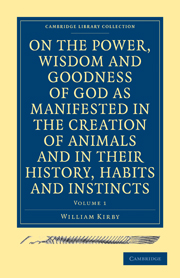Book contents
- Frontmatter
- Contents
- EXPLANATION OF PLATES
- INTRODUCTION
- CHAP. I Creation of Animals
- CHAP. II Geographical Distribution of Ditto
- CHAP. III General Functions and Instincts of Ditto
- CHAP. IV Functions and Instincts. Infusories
- CHAP. V Functions and Instincts. Polypes
- CHAP. VI Functions and Instincts. Radiaries
- CHAP. VII Functions and Instincts. Tunicaries
- CHAP. VIII Functions and Instincts. Bivalve Molluscans
- CHAP. IX Functions and Instincts. Univalve Molluscans
- CHAP. X Functions and Instincts. Cephalopods
- CHAP. XI Functions and Instincts. Worms
- CHAP. XII Functions and Instincts. Annelidans
- APPENDIX
- NOTES AND ILLUSTRATIONS
- Plate section
CHAP. VI - Functions and Instincts. Radiaries
Published online by Cambridge University Press: 29 August 2010
- Frontmatter
- Contents
- EXPLANATION OF PLATES
- INTRODUCTION
- CHAP. I Creation of Animals
- CHAP. II Geographical Distribution of Ditto
- CHAP. III General Functions and Instincts of Ditto
- CHAP. IV Functions and Instincts. Infusories
- CHAP. V Functions and Instincts. Polypes
- CHAP. VI Functions and Instincts. Radiaries
- CHAP. VII Functions and Instincts. Tunicaries
- CHAP. VIII Functions and Instincts. Bivalve Molluscans
- CHAP. IX Functions and Instincts. Univalve Molluscans
- CHAP. X Functions and Instincts. Cephalopods
- CHAP. XI Functions and Instincts. Worms
- CHAP. XII Functions and Instincts. Annelidans
- APPENDIX
- NOTES AND ILLUSTRATIONS
- Plate section
Summary
It happens not seldom to the student of the works of creation, when he is endeavouring to thread the labyrinth of forms in any of the three kingdoms of nature, and has arrived at any given point, to feel doubtful which course to pursue. The road divides, perhaps, into two branches, which both promise to lead him right. At the very outset of the animal kingdom, as we have seen, there was some uncertainty, whether we should begin by the Infusories or Polypes, and now the Tunicaries, or Ascidians as some call them, at the first blush seem more closely connected with the Polypes, than the Radiaries, which Lamarck has placed next to them; but when we consider that the organization is much more advanced in the former than in the latter, not only in the organs of digestion, but in those of sensation, respiration, and circulation, we feel satisfied that the latter, where the object is to ascend, should first be considered. I shall, therefore, now give some account of the Radiaries.
The animals forming this class receive this appellation, because they exhibit a disposition to form rays, both in their internal and external parts, a disposition which begins to show itself, as we have seen, both in the polypes and the infusories with respect to their oral appendages, and is found also in the tunicaries and cephalopods, or cuttle-fish.
- Type
- Chapter
- Information
- On the Power, Wisdom and Goodness of God as Manifested in the Creation of Animals and in their History, Habits and Instincts , pp. 192 - 217Publisher: Cambridge University PressPrint publication year: 2009First published in: 1835

